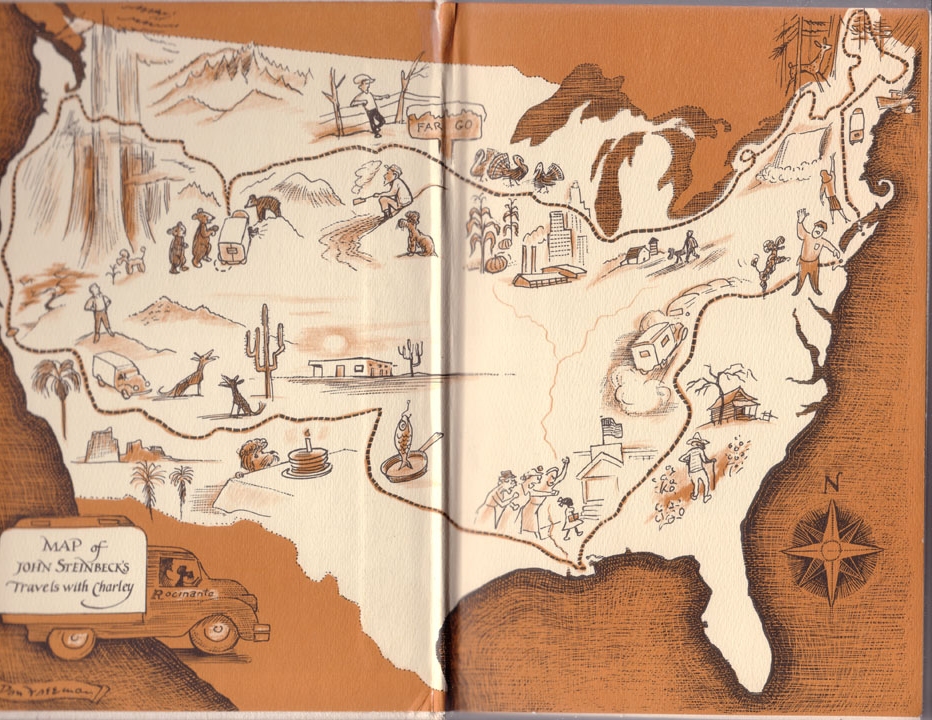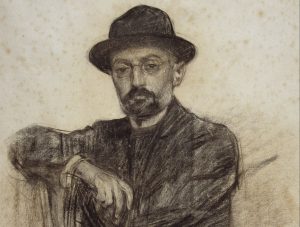“We have in past been forced into reluctant change by weather, calamity, and plague. Now the pressure comes from our biologic success as a species. We have overcome all enemies but ourselves.”― John Steinbeck, Travels with Charley: In Search of America
Eight years before his death, John Steinbeck decides to embark on a journey across America to rediscover its people and landscapes. Concerned that he no longer knows the country well enough to write about it properly, he sets off in September of 1960 with his dignified French poodle, Charley, in an upgraded pickup truck appropriately named Rocinante. This book is a collection of this extraordinary writer’s encounters and observations as he travels through the country, and as close to an autobiography as he will ever write. It is a beautifully conversational travelogue rich with insights and unbelievably visual interactions. It is successful in its attempt to understand and describe the American identity, an identity rooted in America’s historical values and breathtaking landscapes, yet impossible to keep from evolving in an age of mass production, globalization, and desegregation. Steinbeck focuses specifically on this evolution and explores the possibility of human change.
In Travels with Charley, Steinbeck time and time again finds himself in situations that cause him to reflect on the changing physical and metaphorical American landscape. He finds himself protesting against the “assembly-line production of our food, our songs, our language, and eventually our souls,” but recognizes that it is the nature of humans to protest against change, with its attendant romanticizing of the past. I know many a vocal soul who laments the technologies and conveniences of the present and aggressively lauds the simple, and necessarily, better lives we once lived. I think it is pretty easy to say that, despite the fallbacks of a liberal society hypnotized by technology, life is much more comfortable now than at any point in history, and whether this comfort is detrimental to quality of life is for another day. It is interesting to consider, however, where the individual human psyche stands in the face of our society’s evolution.
In the short chapter where Steinbeck and Charley get to the Californian redwoods, Steinbeck ponders the awe-inspiring longevity of these ambassadors of another time. He describes their power to stun visitors into silence out of both reverence and a fear of disturbing something magical. What he describes taking over the visitors’ minds is complete humility. This rare humility is one of the few things which can overpower our illusion of constant human improvement and supposed superiority to forbearers through knowledge and technology. In the presence of the godlike, immortal redwoods, this misplaced arrogance is completely banished. The humility that takes its place reminds us of our liberating impermanence in the order of the natural world. Despite millennia of societal evolution, the human psyche has not succeeded in evolving along with society to fundamentally change who we are. It suffers the same joy and sorrows and is wrought by the same desires of eternity past. Our time, although extended significantly by improved health, is still equally finite.
One need only read records of Roman history and ancient literature to understand that we are essentially the same as we were two thousand years ago. We have even managed to largely resist whatever biological evolution nature could have bestowed on us by creating societies of convenience and comfort that weaken our natural immunities and physical strengths. Thousands of years later and we are still fighting about the same things and looking for the same experiences, simply better-equipped to fight and discover. We are still just as mortal. There are things central to the human experience that will persist, regardless of how much we evolve and innovate. This may seem like an obvious fact, but it is not one that is thought about frequently. It is much easier to get lost in the toys provided by our new technology or the comfort and conveniences that soften the human experience. Once one is lost, however, these distractions- and they are nothing more than distractions- become the things through which she defines the worth of herself and her life.
Our time on this Earth is as rich as it always has been, and contemporary lives possess all the same emotional and spiritual capacities as those of millennia past. There is no need, no precedent for enhancement, improvement, or enrichment. It is a mind-blowingly simple fact, that everything we really need, everything our human psyche really seeks, is already waiting to be accessed, resting in the fabric of the human experience. There is a lesson to be learned from the redwoods, who stand proudly, who exist majestically, despite and in spite of the whirling hurricane of humanity around them. These immortal ambassadors are an example to be emulated, a reminder to us humans, that in our very finite lives, simply existing is enough.







